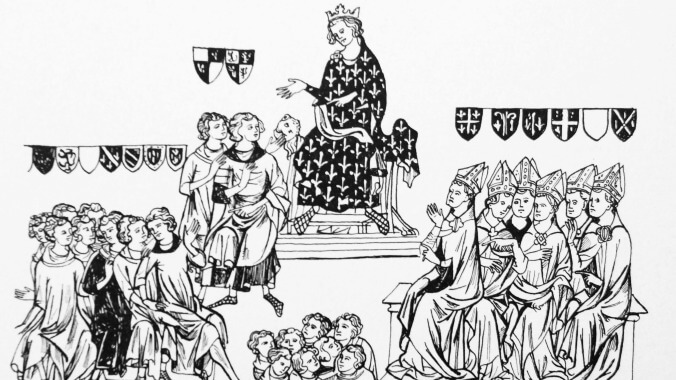Before the Targaryens, there were medieval France’s Accursed Kings


This week’s entry: The Accursed Kings
What it’s about: “The original Game Of Thrones,” according to no less an authority than author George R.R. Martin. The author has claimed his two biggest inspirations in writing his A Song Of Ice And Fire series are England’s War of The Roses (it’s not a coincidence Stark and Lannister are only a few letters off from York and Lancaster), and this series of French historical novels by Maurice Druon, published between 1955 and 1960 (with one final volume coming 17 years later—in your face, The Winds Of Winter). Unlike Martin, however, Druon didn’t need dragons or ice zombies to keep readers captivated. Just the real-life sex, intrigue, and murder among France’s 14th-century nobility.
Biggest controversy: While Druon himself was not terribly proud of his series, insisting the books were written “to make money very quickly,” the series was both immensely popular and critically acclaimed. Martin compared Druon favorably to former Wormhole subject Alexandre Dumas, while The Wall Street Journal’s Allan Massie said Druon evokes historical Paris as well as Victor Hugo, adding, “few figures in literature are as terrible as the Countess Mahaut, murderer and maker of kings.”
But Druon’s books may have no more powerful champion than our era’s own murderous kingmaker, Vladimir Putin. The Accursed Kings’ popularity was so great that the series were among the few Western books to be published in the Soviet Union. Putin grew up on the Russian translations of the series, and once in power, struck up a friendship with Druon. (The author died at the age of 90 in 2009).
Strangest fact: Despite being based on real history, Druon still manages to work in some magic. After King Philip The Fair (The Iron King, per the first book’s title) persecutes the Knights Templar and burns their leader at the stake. The dying man curses Philip, and his family, “to the 13th generation.” That curse plays out over seven books worth of murder and betrayal. In the third book, The Poisoned Crown, scheming Countess Mahaut uses magic to convince now-dead Philip’s son Philippe to free Mahaut’s daughter (and Philippe’s wife) Jeanne from prison.
Thing we were happiest to learn: Magic or not, what really drives the story are mundane, relatable, and human: jealousy, resentment, and revenge. The saga is put into motion when King Philip’s daughter, Isabella (herself queen of England), suspects all three of her sisters-in-law of cheating on her brothers. She teams up with nobleman Robert of Artois, who believes his inheritance was stolen by Mahaut, mother to two of the three sisters-in-law. Meanwhile, Philip’s brother Charles resents that the king’s common-born prime councillor has more influence than he does. What follows is a domino effect of torture, murder, prison, and oddly, a “painful death by means of a poisoned candle,” which Wikipedia declines to explain in further detail.
Thing we were unhappiest to learn: That 17-year wait for the last book was even longer in the English-speaking world. The King Without A Kingdom was published in French in 1977, five years after a wildly successful TV adaptation, but didn’t appear in English until 2015, when HarperCollins reissued the entire series. Wikipedia gives no hints as to why the final book was so long-delayed. The first six were written roughly one per year, and it’s not clear whether Druon planned a seventh book from the start and didn’t get around to writing it, or released a six-book series and decided years later to revisit it.
One plot detail suggests the latter. The sixth book, The Lily And The Lion, ends on a cliffhanger of sorts. In book four, The Royal Succession, Jean I, the newborn heir to the throne, is switched at birth with another baby, who’s then poisoned by Mahaut to put her son-in-law on the throne instead. At the end of Lily, the now-grown child is told his true identity as the rightful king of France. And in the seventh book… we jump ahead 25 years to the reign of Jean II (no relation), and the child from the previous book seems to play no part.
Best link to elsewhere on Wikipedia: Not everyone hailed The Accursed Kings series as classics. Tor.com critic Stefan Raets dismissed The Iron King as “grim-dark” historical fiction. That term dismissively refers to fiction (nearly always genre fiction) “that is particularly dystopian, amoral, or violent,” and piles on misery, often at the expense of story and character development.
Further down the Wormhole: The 1972 miniseries wasn’t the only TV Kings adaptation. A 2005 French-Italian five-episode series starred Jeanne Moreau as Mahaut. Moreau, who passed away in 2017 at age 89, had a long distinguished career, winning Best Actress at Cannes for Seven Days… Seven Nights, a BAFTA for Viva Maria!, a César for The Old Lady Who Walked In the Sea, and lifetime achievement awards from all three organizations. She was also the Cannes jury president in 1975, a distinction she shared with Sophia Loren, the beloved Italian actress.
Loren won the Oscar for Best Actress for 1961’s Two Women, and was given an honorary award in 1991. Forty years earlier, an honorary award was given to George Murphy, a song-and-dance man from the golden age of Hollywood musicals who was later elected to the U.S. Senate, pioneering the well-trod entertainer-with-no-political-experience-to-Republican-leader track. Murphy’s political legacy is mostly limited to establishing the Candy Desk, a tradition in which one desk on the Senate floor is full of candy. We’ll launch an investigation into exactly how sweet it is, next week.